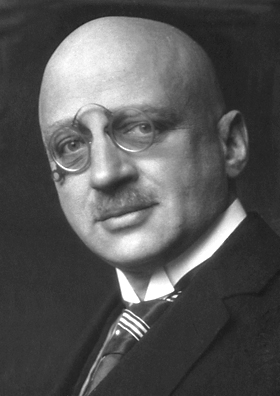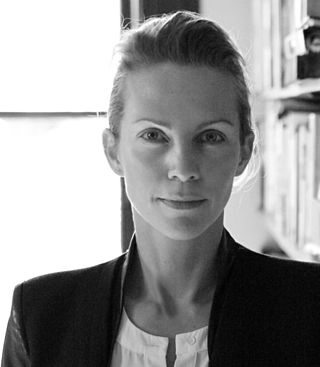Related Research Articles

Fritz Haber was a German chemist who received the Nobel Prize in Chemistry in 1918 for his invention of the Haber–Bosch process, a method used in industry to synthesize ammonia from nitrogen gas and hydrogen gas. This invention is important for the large-scale synthesis of fertilisers and explosives. It is estimated that one-third of annual global food production uses ammonia from the Haber–Bosch process, and that this supports nearly half of the world's population. Haber, along with Max Born, proposed the Born–Haber cycle as a method for evaluating the lattice energy of an ionic solid. For his former mentioned work Haber has been called one of the most important scientists and industrial chemists in human history.

The John D. and Catherine T. MacArthur Foundation is a private foundation that makes grants and impact investments to support non-profit organizations in approximately 117 countries around the world. It has an endowment of $7.6 billion and provides approximately $260 million annually in grants and impact investments. It is based in Chicago, and in 2014 it was the 12th-largest private foundation in the United States. It has awarded more than US$7.92 billion since its first grants in 1978.

Seth Woodbury MacFarlane is an American actor, animator, writer, producer, director, comedian, and singer. MacFarlane is well-known as the creator and star of the television series Family Guy and The Orville, and co-creator of the television series American Dad! and The Cleveland Show (2009–2013). He also wrote, directed, and starred in the films Ted (2012), its sequel Ted 2 (2015), and A Million Ways to Die in the West (2014).

David Jonathan Gross is an American theoretical physicist and string theorist. Along with Frank Wilczek and David Politzer, he was awarded the 2004 Nobel Prize in Physics for their discovery of asymptotic freedom. Gross is the Chancellor's Chair Professor of Theoretical Physics at the Kavli Institute for Theoretical Physics (KITP) of the University of California, Santa Barbara (UCSB), and was formerly the KITP director and holder of their Frederick W. Gluck Chair in Theoretical Physics. He is also a faculty member in the UCSB Physics Department and is affiliated with the Institute for Quantum Studies at Chapman University in California. He is a foreign member of the Chinese Academy of Sciences.
Eva Silverstein is an American theoretical physicist, cosmologist, and string theorist. She is a professor of physics at Stanford University and director of the Modern Inflationary Cosmology collaboration within the Simons Foundation Origins of the Universe initiative.

Paul Berg was an American biochemist and professor at Stanford University.

Armand Paul Alivisatos is an American chemist and academic administrator who has served as the 14th president of the University of Chicago since September 2021. He is a pioneer in nanomaterials development and an authority on the fabrication of nanocrystals and their use in biomedical and renewable energy applications. He was ranked fifth among the world's top 100 chemists for the period 2000–2010 in the list released by Thomson Reuters.
The MacArthur Fellows Program, also known as the MacArthur Fellowship and colloquially called the "Genius Grant", is a prize awarded annually by the John D. and Catherine T. MacArthur Foundation to typically between 20 and 30 individuals working in any field who have shown "extraordinary originality and dedication in their creative pursuits and a marked capacity for self-direction" and are citizens or residents of the United States.

Dinaw Mengestu is an Ethiopian-American novelist and writer. In addition to three novels, he has written for Rolling Stone on the war in Darfur, and for Jane Magazine on the conflict in northern Uganda. His writing has also appeared in Harper's, The Wall Street Journal, and numerous other publications. He is the Program Director of Written Arts at Bard College. In 2007 the National Book Foundation named him a "5 under 35" honoree. Since his first book was published in 2007, he has received numerous literary awards, and was selected as a MacArthur Fellow in 2012.

Terrance Hayes is an American poet and educator who has published seven poetry collections. His 2010 collection, Lighthead, won the National Book Award for Poetry in 2010. In September 2014, he was one of 21 recipients of a prestigious MacArthur Fellowship, awarded to individuals who show outstanding creativity in their work.
Markus Greiner is a German physicist and Professor of Physics at Harvard University.

John Ochsendorf is an American educator, structural engineer, and historian of construction; he is a professor in the Department of Architecture and the Department of Civil and Environmental Engineering at the Massachusetts Institute of Technology. He is widely known for becoming a MacArthur Fellow in 2008 He served as the Director of the American Academy in Rome from 2017 to 2020. In 2022, he was appointed the founding director of the newly created MIT Morningside Academy for Design.

Anna Schuleit Haber is a German-American visual artist. Throughout her career, Schuleit Haber's work has focused on marginalized communities.
Tyshawn Sorey is an American composer, multi-instrumentalist, and professor of contemporary music.

Jens Kehlet Nørskov is the Villum Kann Rasmussen professor at the Technical University of Denmark. He is a Danish physicist most notable for his work on theoretical description of surfaces, catalysis, materials, nanostructures, and biomolecules.

Yotam Haber is a composer based in Kansas City. He is a 2005 Guggenheim fellow, a 2007 Rome Prize winner in Music Composition., and was named a 2023-2024 Fulbright Distinguished Senior Scholar, teaching and researching at the Jerusalem Academy of Music and Dance.

Jun Ye is a Chinese-American physicist at JILA, National Institute of Standards and Technology, and the University of Colorado Boulder, working primarily in the field of atomic, molecular and optical physics.
Monika Schleier-Smith is an American experimental physicist studying many-body quantum physics by precisely assembling systems of ultracold atoms. These atomic, molecular, and optical physics (AMO) engineered systems have applications in quantum sensing, coherent control, and quantum computing. Schleier-Smith is an associate professor of physics at Stanford University, a Sloan Research Fellow, and a National Science Foundation CAREER Award recipient. Schleier-Smith also serves on the board of directors for the Hertz Foundation.
IRENE is a digital imaging technology designed to recover analog audio stored on fragile or deteriorating phonograph cylinders, records, and other grooved audio media. It is in use by several archives and preservation institutions in the United States seeking to preserve and digitize historical audio.
References
- ↑ "Carl Haber". MacArthur Foundation. 25 September 2013. Retrieved 22 October 2014.
- ↑ "MacArthur Foundation". www.macfound.org. Retrieved 2018-07-21.
- ↑ Basu, Tanya (25 September 2013). "How Genius Carl Haber Restores Long-Lost Sounds". National Geographic. Archived from the original on September 26, 2013. Retrieved 22 October 2014.
- ↑ "Carl Haber". MacArthur Foundation. 25 September 2013. Retrieved 22 October 2014.
- ↑ "APS Fellow Archive". APS. Retrieved 18 September 2020.